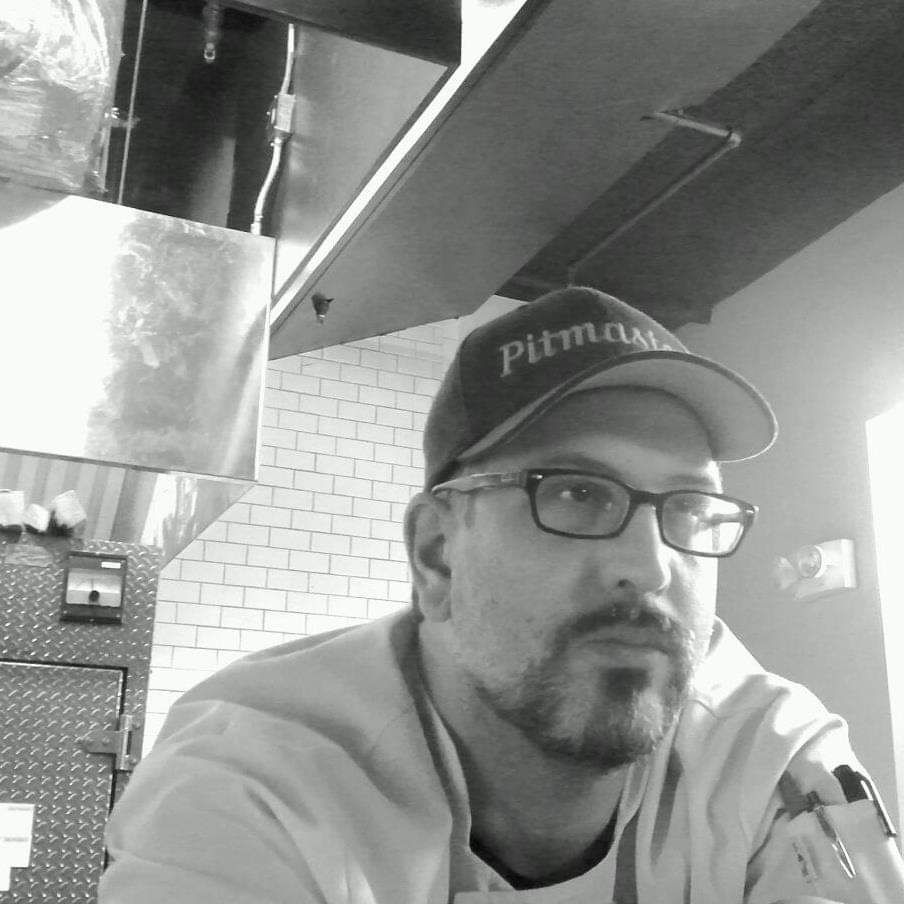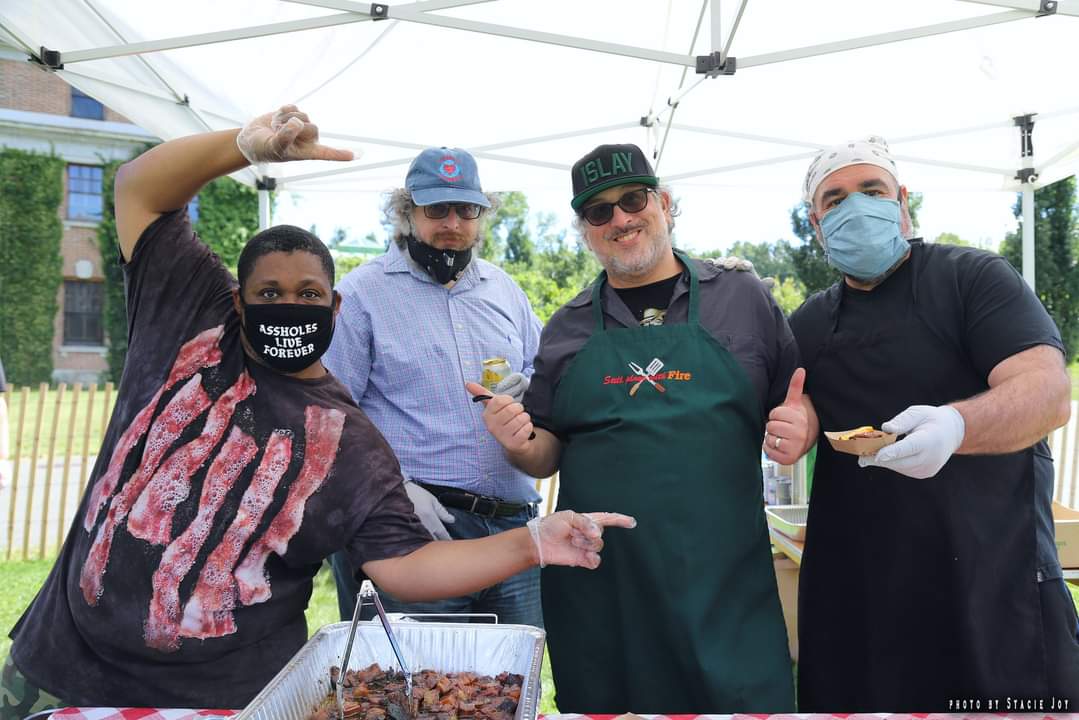In his own words, Matt Fisher fell into barbecue sideways, but he hasn’t sidestepped his way out of the business in over two decades. He’s worked with well known pitmasters like Scottie Smith and Robbie Richter, and their mentorship, along with advice from other barbecue experts over the years, shaped Matt’s cooking into the juicy ‘cue it is today. Matt’s Laphroaig glazed pork belly burnt ends with summer corn pudding took home the best bite award at last year’s Pig Island, and he’ll be bringing the same fire to Brisket King ® 2021. Keep an eye on Matt’s website where he’ll announce his pop-up events throughout the spring and buy your Brisket King tickets here.

Food Karma: Tell us about your career trajectory.
Matt Fisher: My wife and I started an under the radar, independent barbecue catering business in the East End of Long Island in the Hamptons around 2002 and we did that for about five years. That was really the beginning of everything. We did the Big Apple Barbecue block party as part of Hill Country’s team. The event was the day they opened their first restaurant and my friend Rob was their pitmaster. He was at the opening of the restaurant and had me running their pits at the block party. I would say that that was probably my first professional gig where it was above board and I was affiliated with somebody.
In 2007 I was hired to open Wildwood Barbecue with Big Lou Elrose. He was the pitmaster and I was his sous.That was for BR Guest restaurant group who had about sixteen restaurants around the country at that point. I stayed there for about two years and then in 2009 I moved to RUB BBQ, which was on 23rd between 7th and 8th. That was Paul Kirk’s restaurant, he’s a barbecue cookbook author and editor. I worked with Chef Scott Smith there for about four years.
In 2012 I went on and opened Fletcher’s Brooklyn Barbecue with my partner. I was there for about seven years. In 2019 I went to Dinosaur Barbecue and was kitchen director of their Harlem location. I had an injury on the job and stopped working. Right as I was getting ready to go back, looking forward to starting a new job, the pandemic hit and everything kind of shut down completely. Now I’m back to working under my Atom’s Ribs brand, starting to do consulting and catering but working on plans to have a full scale project in the near future.
FK: How did you get into barbecue in the first place?
MF: I started cooking very young. My dad ran away from home in his teens and joined the merchant marines. He got deployed to their galley and was trained under someone who was actually a graduate of Le Cordon Bleu so he had this really great foundation in all types of traditional cooking techniques. From the earliest time I can remember, around five years old, I was standing on a chair and stirring pots and making bread and dumplings and drying pasta, not realizing I was getting a great education.
After college, I had various day jobs, but at some point around ‘96 or so, a friend moved out and left me his Weber kettle. I started remembering the road trips I had taken with my family in the South. We had family in North Carolina and Virginia and had driven through going to Florida, and the food that we had eaten there wasn’t really available in this area, so I started making it myself, not knowing that barbecue was about to become the next culinary trend. I just kept cooking it on the weekends and started to have people ask me to cater parties for 30 people, 40 people, 150 people and bought more and more barbecue pits.
During that time, I had a job for about seven years where I got to travel throughout the country. Everywhere I went I started talking to chefs and pitmasters and getting secret tours of the kitchen. In New York City at that point, there were probably half a dozen at most really serious barbecuers that were around. It was a very small circle, and as I networked I got to know everyone. There really weren’t a lot of us had received the religious calling of the smoke. I was out there keeping a journal: it’s 61 degrees when I fired up the pit with wind out of the southwest 15 miles per hour, I put one log in a criss cross pattern (see diagram). I was so geeking out about what I was doing and didn’t know that it was really kind of rigorous training for the career.
So that’s how it happened. It was a passion turned hobby slash calling slash, “you need somebody who has cooked a hog in the pouring rain? I’m your guy.” Suddenly, ten thousand hours had passed, and I was lucky to turn what I love into a career without destroying it. It’s cool, not very many people walk sideways into it. I didn’t work up from dishwasher, so the culture shock of going from a cubicle and wearing a tie and having a case of the Mondays to somebody yelling, “get that goddamn plate into the dining room,” it’s a really different world. I was lucky to work with great chefs who were patient and really grilled great information into me.
The truth is, I consider all of my barbecue friends to be mentors and colleagues. I think the cool thing about loving barbecue is that you continue to learn about it every time you do it or every time you talk to someone else or you eat their food. You think, “oh wow, that’s a really smart way of solving that problem” or doing that dish that’s been done before but in a way that you honor it but bring your own personal slant to it. I think it’s just natural that being in New York City and being exposed to the wealth of ingredients and cultural touchstones that we have, that if you’re a curious eater or a curious cook that it will come into your process. I think about that in the great barbecue that I’ll get at Mabel’s or Mighty Quinns or any of the other really awesome cool newer generation barbecue places in the city. There’s just some really interesting things that are going on. It’s all kind of mentoring if you’re open to it. You never want to steal someone’s great idea, but if they can spark your own, that’s the whole process.

FK: What are your thoughts on all the great Jewish and kosher barbecue in New York?
MF: There’s some really great participants in Brisket King for sure who are from New York City and the neighboring areas who have come and presented their food and competed and won. The idea of a kosher barbecue restaurant was always kind of in my mind. I don’t mean to say I’m taking credit for the boom, but growing up Jewish and having a father that worked with a lot of prominent rabbis in his career and being surrounded by that, Iloved the idea of doing a food that would seem kind of off limits and finding a way to make it available to an entire other culture, an entire other part of the world should be feasting on barbecue.
I could never really figure out the Friday night problem into Saturday, how do you keep it going? My friends have done that. Izzy in Brooklyn and Ari from Wandering Que and a lot of these guys who have found ways to not only adopt barbecue to some of the cultural laws, but also really innovate within it and take traditional Jewish cuisine or kosher Jewish cuisine and American Jewish cuisine and really bring it organically through the process of reflecting the food of their dietary laws.
The inventive dishes are very much in keeping with the spirit of the way that I approach barbecue where you marry it with other things in unexpected ways. They’ve certainly really done that and not to mention through cooking very, very expert craft barbecue at the same time, consistently. All of those things are hard to do.
I haven’t heard this, but for anybody who would call it a fad or a novelty, that’s crazy talk. Because of the sourcing of the ingredients and some of the other complications of making it, it’s certainly a higher priced product than traditional barbecue, but the cost of all kinds of food and craft foods and labor are going up. It’s not a limitation on what they can do.
FK: What should we expect from you at Brisket King and in the near future?
MF: I am going to be doing a series of pop ups over the next couple of months. You can find them on my website as they are announced. At Brisket King, I’m coming to bring our signature hospitality and strong flavors, plenty of good smoke flavoring, and my charming team who have been with me at the most recent Pig Island events and other food events that I’ve done around the city of Adrian Ashby and Jonathan Forgash along with my wife, Amy. We’re going to be dishing up plenty of tasty, tasty brisket goodness.
FK: Anything else you want to share?
MF: Just that I am always happy to support the events that Jimmy puts together. I appreciate that there’s always a component of some kind of giving back and that there truly is a great community of chefs that consistently show up for him, and there’s obviously a reason for that. We always appreciate the people who come and support the events, and they’re always really enthusiastic. It’s always one of the things I really look forward to as a New York City chef. I’m really happy that he continues to do them and that he’s feeling better.
